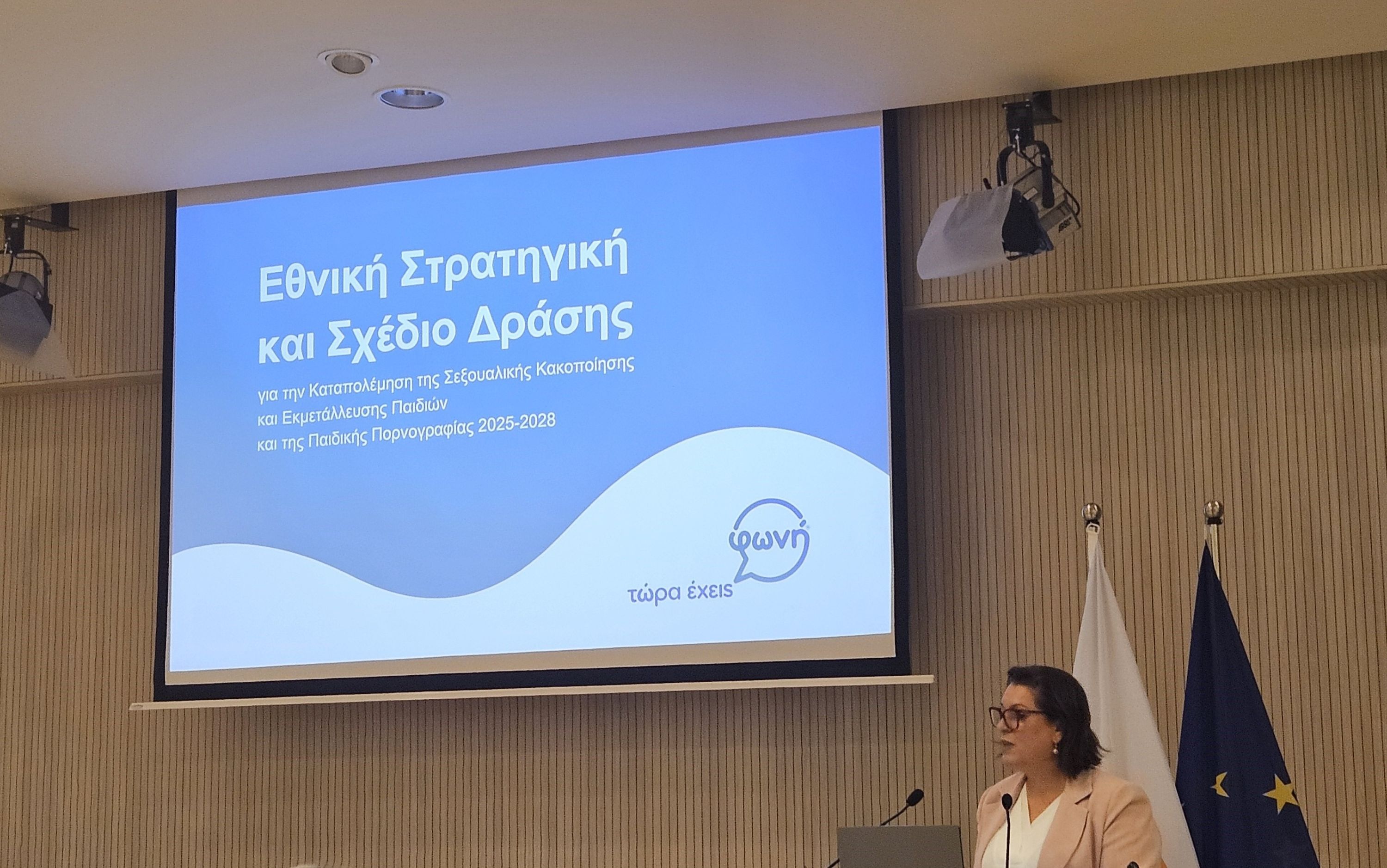By Johanna Pauls
Justice Minister Marios Hartsiotis said more than 900 complaints of child abuse had been reported in the last three years, speaking on Thursday at the presentation of the national strategy and action plan for the prevention and combatting of child abuse.
“It is the legal, moral, and institutional obligation of the state for the child to grow up in an environment of safety and protection,” Hartsiotis said.
He emphasised that protecting children from all forms of abuse remains a state priority. A relevant law aimed at preventing and combatting the sexual abuse of children has been in place for 11 years, with amendments currently underway to address identified gaps.
Hartsiotis also noted plans to reform the supervision of convicted sexual offenders, allowing for stricter measures after their release.
The national strategy was presented by non-profit organisation Foni (‘Voice’ in Greek) council president Clea Papaellina. Structured around six pillars, it focuses on primary, secondary, and tertiary prevention, as well as research, evaluation and international cooperation.
Papaellina said that primary prevention involves informing the public and training parents, children, and professionals — including teachers, doctors, and judges — to help reduce abuse cases.
Secondary prevention, she said, aimed to identify vulnerable social groups prone to developing behaviours that could potentially result in for child abuse. This, the council president said, involves strengthening frontline services and children’s homes to ensure that victims receive adequate and holistic support.
She also called for the creation of a national child abuse registry to serve as a central archive for information exchange between authorities.
Tertiary prevention, she said, includes initiatives to prevent the revictimisation of children and further harm. She cited the Foni Children’s House and ‘Nima centre’ – which offers psychological support to adults who were sexually abused as children – as established examples of good practice in Cyprus.
“At the Children’s House, children are prepared before appearing in court, with psychological, social, and legal support provided in close cooperation with the prosecution authorities,” she said.
Since its establishment in 2017, she added, some 2,600 children have been referred to the facility.
Papaellina stressed the importance of systematic data collection and analysis for policymaking. Referring to a 2015 study by the University of Cyprus’ psychology department, she said only 16 per cent of victims in Cyprus had sought help.
A new study, funded by the Leventis Foundation, is currently underway, with results expected in 2026. These will offer a ten-year comparison with the previous findings and help guide the next decade of action.
Evaluation is the fifth pillar of the strategy. Papaellina stressed that the effectiveness of programmes can only be ensured through continuous monitoring.
As the final sixth pillar, Papaellina referred to the cooperation with international bodies.
“Withing the framework of the Cypriot presidency, Foni will organize a conference on “Innovative practices in the management of the prevention and fight against child sexual abuse”, she said, adding that this served as an opportunity to highlight the issue at a European level.
Deputy Minister of Welfare, Marilena Evangelou said the social welfare services prevention policies as well as plans to expand the concept of the neighbourhood workers were currently in progress, stressing the importance of collaborative effort.
“More and more children are speaking out in recent years. At the same time, each new incident is a stark reminder that the struggle is ongoing and shared,” she said.
On behalf of the health ministry, dental services director Andri Aristotelous said the ministry’s main focus is on prevention and early intervention. This includes training healthcare professionals to detect signs of abuse and enhancing mental health services for children and youth.
As the council for the implementation of the national strategy for combatting sexual abuse and exploitation of children, Foni is responsible for the planning of the national strategy, the monitoring of its implementation and the provision of respective Cyprus-related data.
Also present at the event, Education Minister Athena Michaelidou highlighted her ministry’s crucial role in implementing relevant measures and empowering both students and educators.
She said that holistic, mandatory sexual education is already being delivered across all grades in public and private schools. Training programmes for teachers were carried out during the 2024–2025 academic year.
Additionally, she said an updated teacher’s manual on recognising and managing incidents of sexual abuse is in progress, stressing the key role educators play in prevention and intervention.
“What I have briefly mentioned demonstrates our strong will to meet our duty and our moral responsibility to ensure the right of children to grow up in safe conditions,” she said.
The national action plan will cover the years 2025 to 2028 and will focus on combatting child abuse, sexual exploitation and the spread of child sexual abuse material.
The first council for the implementation of the national strategy was formed in 2018, comprising a chairperson appointed by the president and nine members appointed by the Council of Ministers.
In 2017, a special police team dedicated to investigating cases of child abuse and exploitation was established and continues its work today.






Click here to change your cookie preferences